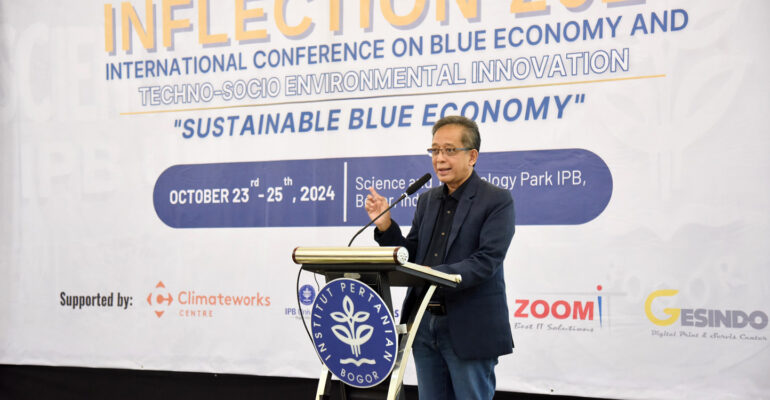INFLECTION IPB University Realizes New Direction of Blue Economy in the Midst of Global Climate Change

IPB University held the International Conference on Blue Economy and Techno-Socio Environmental Innovation (INFLECTION) 2024 at the Startup Center Building, Taman Kencana Campus, Bogor (24/10). The conference discussed the new direction of blue economy development amidst the challenges of global climate change.
Chief of International Research Institute (LRI) Maritime, Marine and Fisheries (i-MAR) IPB University, Prof Luky Adrianto said INFLECTION 2024 is an event to bring together various ideas and expertise by presenting international speakers, researchers, and students from various countries and government representatives.
“We will focus on how the blue economy contributes to achieving the Sustainable Development Goals (SDGs), to ensure a balanced and prosperous future for humans and the marine environment,” he said.
Prof Luky hopes that the conference will be an accelerated effort for new partnerships, innovative solutions, and a shared vision to create a resilient and sustainable blue economy.
“Together, we can have the opportunity to manage wisely and protect marine and coastal resources for future generations,” he said.
Expert Staff on Leading Sector and Infrastructure Development, Ministry of National Development Planning, Dr Leonardo AA Teguh Sambodo said, in the coming years, countries in the world will increasingly protect natural resources to be used as capital for food security.
He said that the impact of climate change will also increase in the future.
“The development of the blue economy on the global stage is getting more and more attention as each country begins to realize the importance of sustainable use of marine resources. This includes countries that are members of the Organization for Economic Co-operation and Development (OECD) and the European Union,” he said.
Leonardo added that the role of the blue economy can optimize scientific and technological advances and create value-added economic opportunities.
“This blue economy can also provide social and economic impacts for current and future generations,” he said.
Director of Marine Spatial Planning, Ministry of Maritime Affairs and Fisheries, Ir Suharyanto, MSc explained that the marine spatial planning policy also has legal force that binds all stakeholders in the utilization of natural resources and environmental services in the sea.
“This policy is based on philosophical awareness of togetherness and consistency in overcoming the threat of global climate change, maintaining the sustainability of ecosystems and endemic biota in the sea, and running a sustainable blue economy,” he said. (dr/Rz) (IAAS/RUM)



